Top 10 Startups of the Month: September 2025 Edition
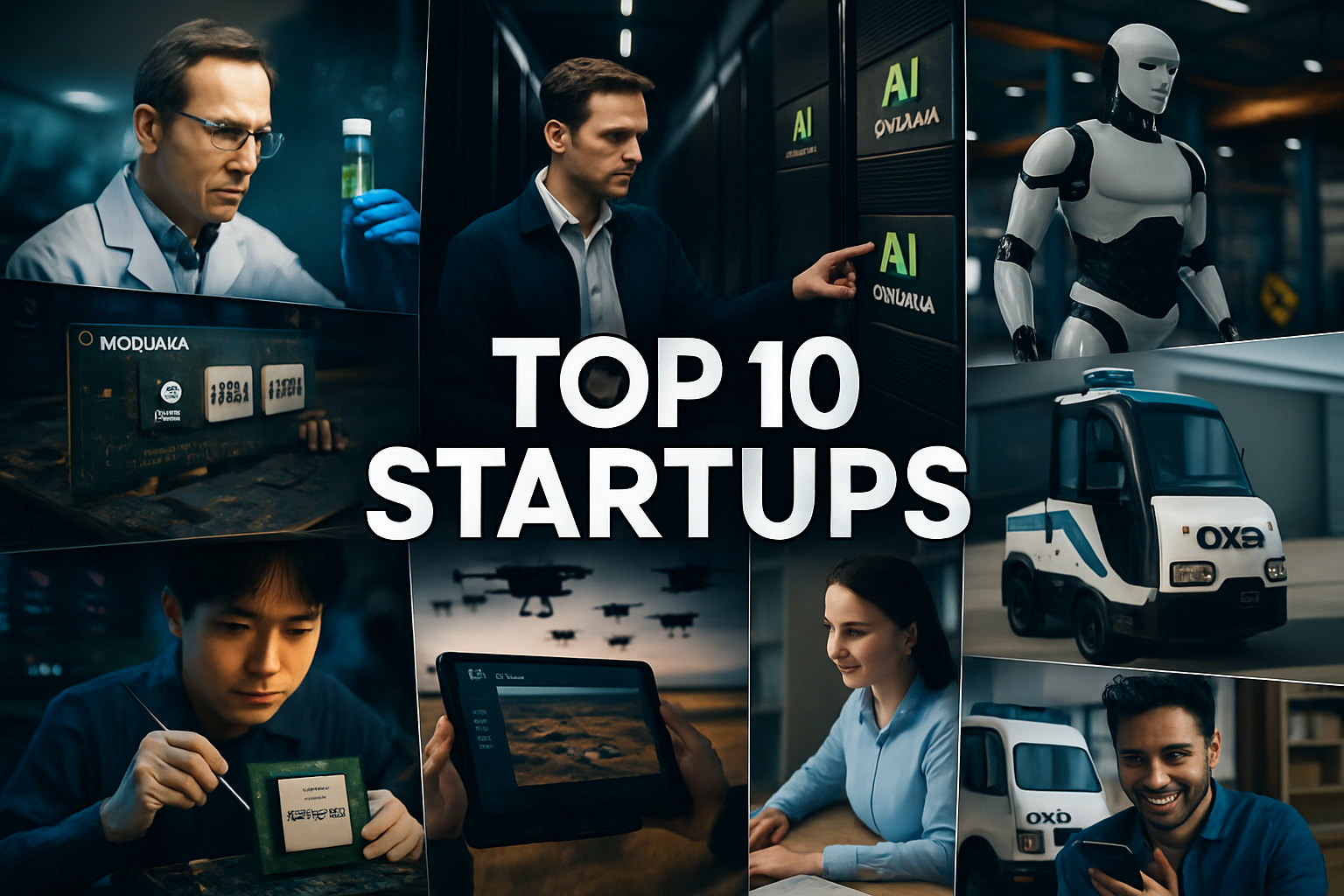
The most promising ventures are redefining industries in the UK and across the globe.
The most ambitious young companies aren’t chasing headlines — they’re building the machinery of tomorrow.
And this September, they’ve been busy.
Drones that think as one, not as many. A pill that might teach the brain to forget how to grow old.
Chips that chip away at monopolies, and a software layer that finally sets developers free. In the UK, fibre meets sovereignty, banking forgets it’s a bank, and industrial robots stop being a concept and start showing up for work.
This isn’t the glossy, surface-level innovation that fills keynote slides. It’s deeper — the foundations, the scaffolding, the invisible architecture that lets societies grow bolder. These teams aren’t chasing hype. They’re fixing what’s broken, replacing what’s outdated, and daring to build what doesn’t exist yet.
One of them will earn the title of Startup of the Month. But every single one has already left its mark on September — and on the future that’s quietly being built beneath our feet.
Top 5 UK Startups
1. Nscale — Britain’s Bid for AI Sovereignty
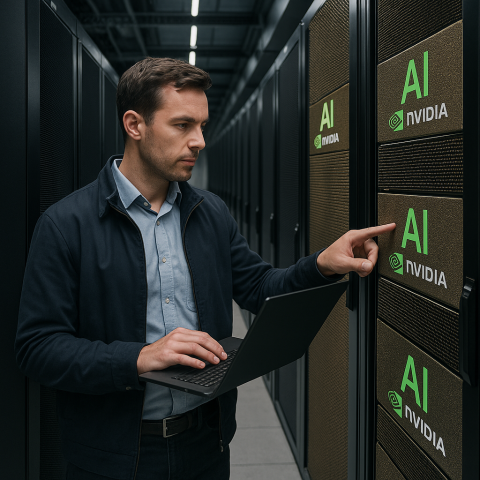
Most revolutions arrive with fanfare. This one began with a press release and a few lines of code — yet it might change how Europe builds its future. In September, Nscale stepped out of the shadows and did something audacious: it announced a plan to build the continent’s largest sovereign AI cluster, right here in the UK. The numbers are absurd — over 120,000 Blackwell GPUs, partnerships with Microsoft, OpenAI and NVIDIA, and a £500 million investment from Jensen Huang’s empire itself. But this isn’t just about scale. It’s about independence.
For decades, Europe’s tech ambitions have been quietly hostage to American clouds and Asian fabs. Nscale wants to break that dependency and put British data on British soil — a move that’s as political as it is technical. And people are paying attention. When even Silicon Valley insiders start asking if they’ll need a London strategy, you know something’s shifted.
It’s early, of course. Most of this power is still being built, cables still being laid, contracts still being signed. But the intent is clear — this is about sovereignty, not server racks. And if Nscale pulls it off, the UK won’t just use the next generation of AI infrastructure. It will own it.
“Infrastructure is destiny. And Britain has quietly decided to write its own.”
2. Oxa — Where Autonomy Actually Matters
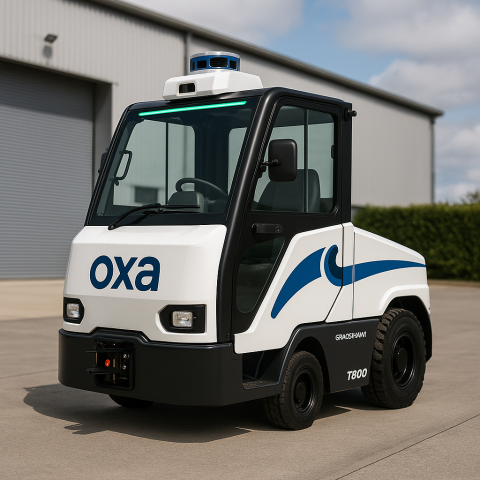
We keep hearing about self-driving cars, drone taxis, robot vans. Most of it feels like science fiction with a press team. Meanwhile, in an unglamorous warehouse outside Oxford, something far more useful rolled quietly onto the floor this September — Oxa’s Bradshaw T800.
It doesn’t look futuristic. No sleek chrome curves. No marketing slogans pasted across the chassis. It just moves eight tonnes of cargo from one end of a logistics hub to the other — over and over again, without coffee breaks, without complaining, and without crashing into anyone. That’s it. And yet that “it” might change how the world ships, stores, and distributes everything from cereal to car parts.
The first pilots in Britain and Germany are already telling the story: lower accident rates, faster turnaround, fewer late-night forklift shifts. Inside, NVIDIA’s newest compute brains are doing what humans can’t — reacting in milliseconds to unpredictable routes and learning the shape of the factory floor as they go.
Funny thing is, you won’t see the T800 on magazine covers. But you will see its impact in profit margins, delivery schedules and safety briefings. Maybe that’s the whole point — the real future of autonomy isn’t about showing off. It’s about quietly taking over the jobs that make the world run.
“The revolution isn’t coming to your driveway. It’s already working the night shift.”
3. Tide — The Bank That Forgot It Was a Bank

Some revolutions don’t arrive with noise. They sneak in through the back door, replace the old furniture, and by the time you notice — the room feels different. That’s pretty much what Tide did to small-business banking this September. No flashy slogans, no moon-shot promises — just a $120 million raise from TPG and a quiet leap into unicorn territory with a valuation north of $1.5 billion.
But the money isn’t the story. The story is what Tide is turning into: a platform that runs a business so smoothly you forget there’s a bank underneath it. AI agents now handle invoices before you’ve even looked at them. Tax filings assemble themselves in the background. Reminders, reconciliations, compliance checks — all that draining, soul-sucking admin melts away while you get back to, well, actual work.
I spoke to one café owner who described it perfectly: “It’s like the banking part evaporated. It just does what it’s supposed to and leaves me alone.” And in that sentence lies the entire point — banking isn’t supposed to be exciting, it’s supposed to be invisible.
While traditional banks are still dragging their feet through committee meetings about “digital transformation”, Tide simply did it — and shipped the future. It didn’t shout about disruption; it just became too useful to ignore.
“The best banking isn’t about money. It’s about giving you back your time.”
4. Conduct — Taming the Corporate Dinosaurs
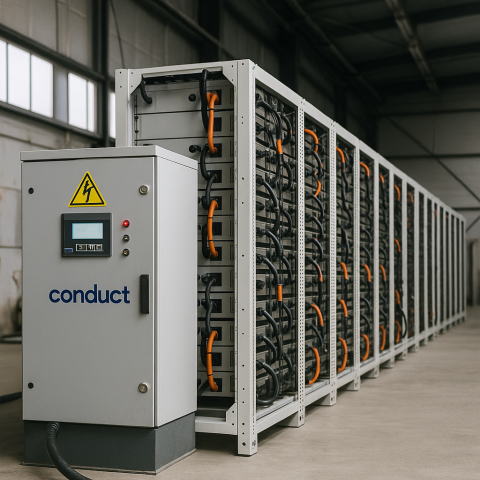
If you’ve ever worked inside a big company, you already know the pain: screens full of grey buttons, endless dropdown menus, a labyrinth of approvals just to change someone’s phone number. This is the world of legacy enterprise software — a world that seems allergic to change. And yet, in September, a small London startup called Conduct decided to poke that sleeping dinosaur with a very sharp stick.
Fresh out of stealth and armed with €11.2 million in seed funding, Conduct is doing something deceptively simple: adding an AI “layer” on top of old ERP systems like SAP, Oracle, and their friends from the 1990s. The goal isn’t to replace them — good luck convincing a 40-year-old logistics company to tear out its backbone — but to make them bearable. The AI observes workflows, learns the boring bits, and starts doing them automatically.
The early results are, frankly, shocking. Processes that once took three days now finish before lunch. Data entry nightmares evaporate. Meetings once scheduled to “align stakeholders” simply don’t happen because there’s nothing left to align. One manufacturing exec I spoke to described it as “putting a Formula 1 engine in a horse-drawn cart.”
This isn’t the sort of startup that headlines TechCrunch parties. It’s the kind that quietly rewrites how the corporate world gets things done. And that, ironically, might make it one of the most impactful ideas of the year.
“The future isn’t about replacing old systems — it’s about teaching them new tricks.”
5. Fyxer AI — Time, Reclaimed

Ask any founder, CEO, or busy executive what they wish they had more of, and the answer is almost always the same: time. Not money. Not talent. Just time — to think, to plan, to build. That’s exactly the void Fyxer AI is trying to fill, and judging by its latest move, it’s getting dangerously good at it.
In September, the London-based startup closed a $30 million Series B round to scale its virtual executive assistant — a tool that does far more than manage calendars. It reads and drafts emails with context you don’t have to explain twice. It schedules calls before you remember to. It researches prospects, chases invoices, builds summaries — and does it all without ever asking for a lunch break. The result? You stop “managing” your day and start owning it.
It’s not about gimmicks or flashy AI demos. What makes Fyxer powerful is its quiet presence — that feeling of breathing room in a week that used to feel suffocating. One founder told me, half-joking: “It’s like hiring a second version of myself, only this one never sleeps or complains.” And that’s exactly the point.
This isn’t just software. It’s leverage — the rarest kind. The kind that gives ambitious people the one thing they can’t scale: their attention.
“Productivity isn’t about doing more. It’s about doing only what matters.”
Top 5 Global Startups
6. Auterion — Teaching Machines to Fly in Packs

We talk a lot about drones. Usually, it’s in the context of flashy deliveries or dystopian headlines. But what Auterion is building isn’t about gadgets — it’s about systems. In September, the Swiss-American startup closed a $130 million Series B round and launched Nemyx, a platform that lets fleets of autonomous drones operate like coordinated teams rather than expensive toys.
Here’s the difference: most drones today are lone wolves. They fly, they film, they return. Nemyx flips that model on its head. It turns a scattered swarm into an intelligent unit — dozens, even hundreds of machines that can map disaster zones, patrol borders, deliver supplies or perform complex military missions together, adapting in real time without a single joystick in sight.
It’s a leap forward for autonomy — and for strategy. Governments, logistics firms, and even humanitarian organisations are already lining up to test what coordinated flight can do. It’s not science fiction anymore; it’s infrastructure. And once machines start collaborating the way humans do, the definition of “airspace” changes forever.
One defence analyst I spoke to put it bluntly: “This isn’t about drones. It’s about air dominance, and whoever masters swarms will own the skies.”
“The future of robotics won’t be built one machine at a time — it’ll be built in formation.”
7. Retro Biosciences — Rewriting the Clock Inside Your Head

We spend our lives measuring time — birthdays, deadlines, anniversaries — but the cruelest clock of all is the one ticking inside us. That’s the one Retro Biosciences is trying to rewrite. In September, the California-based longevity startup announced a milestone that once belonged firmly to science fiction: the launch of its first clinical trial for RTR242, a pill designed to clear cellular junk from the brain and potentially slow — or even reverse — cognitive decline.
It’s not a miracle cure, not yet. But the idea itself is radical. Instead of fighting Alzheimer’s when it’s too late, Retro wants to intervene earlier — restoring the brain’s natural housekeeping systems and extending its functional lifespan. If they’re right, this could mean more than longer lives. It could mean sharper minds at 80 than most people have at 50.
Investors, unsurprisingly, are watching closely — among them Sam Altman, who’s betting heavily on the notion that ageing isn’t inevitable but programmable. But the real momentum is coming from patients and families, who see in RTR242 something rare in medicine: hope before decline.
We’ve spent decades treating age like a disease without a cure. Retro’s work suggests it might be a design flaw — and design flaws, as any engineer will tell you, can be fixed.
“If ageing is just code, then maybe it’s time we learned how to debug ourselves.”
8. Rebellions — Silicon With an Accent
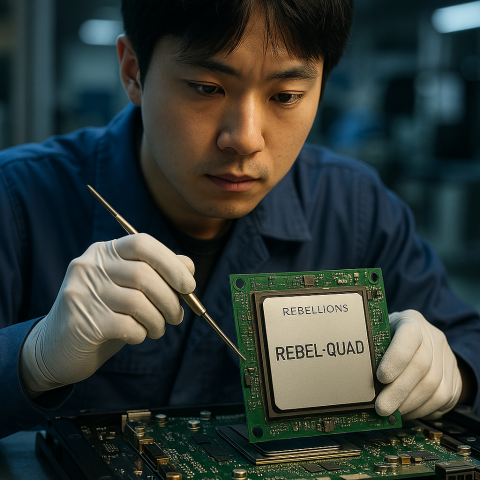
For as long as anyone in AI can remember, the story of chips has been painfully predictable: California makes them, the rest of the world buys them. NVIDIA sits on the throne, and everyone else just pays rent. That story might finally be cracking — and the noise is coming from Seoul.
This September, a young company called Rebellions landed a $250 million Series C round and a valuation of $1.4 billion. Their mission? To ship Rebel-Quad, a new inference chip that doesn’t try to out-muscle NVIDIA on raw brute force — it tries to out-think it. The design is leaner, more power-efficient, and built for the edge cases big data centres struggle with. And suddenly, hyperscalers and AI labs have something they haven’t had in years: a real alternative.
There’s politics baked into the silicon too. Seoul is backing the company as part of a national push for chip independence, and Arm, Samsung Ventures and others are already on board. It’s not just about chips — it’s about sovereignty, about rewriting the map of who gets to build the foundations of intelligence.
I spoke to one engineer who summed it up beautifully: “It’s not that NVIDIA will disappear. It’s that they’ll finally have to look over their shoulder.” And maybe that’s the real revolution — not the overthrow of a king, but the first hint that he’s no longer untouchable.
“The future isn’t built by giants alone. Sometimes it’s written by the ones who dare to chip away.”
9. Modular — Cracking the CUDA Cage
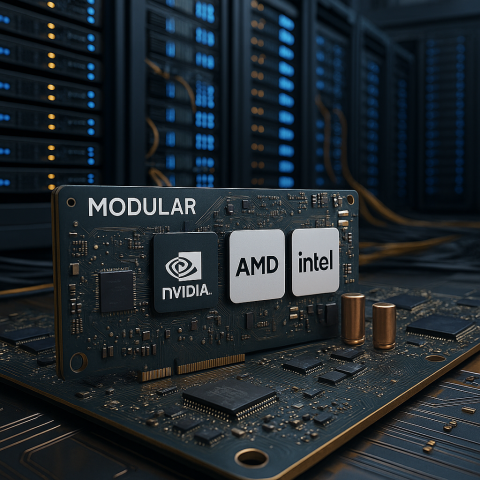
For the last fifteen years, anyone building serious AI software has had to make a silent deal: write for NVIDIA’s CUDA ecosystem or prepare for a world of pain. It wasn’t a choice. It was a law of nature — like gravity or taxes. Modular exists to break that law.
This September, the Boston-based startup raised a hefty $250 million Series C round at a $1.6 billion valuation, but the funding is almost a footnote. The real story is the thing they’re building: a unified compute layer that lets developers run AI workloads across any hardware — CPUs, GPUs, even custom accelerators — without rewriting their code from scratch. It’s as if someone handed developers the keys to an ecosystem that isn’t locked to one company’s silicon anymore.
It’s a deeply technical achievement, but its implications are enormous. For startups, it means freedom from vendor lock-in. For cloud providers, it means flexibility in how they build and scale their infrastructure. And for the entire industry, it means the monopoly that shaped AI’s first chapter might not control the second.
One engineer I spoke with described it with a grin: “It’s like someone finally picked the lock on the cage.” And once a cage is open, you don’t close it again — the ecosystem changes forever.
“The real breakthroughs aren’t loud. They’re the ones that quietly make the old rules optional.”
10. Figure AI — When Robots Stop Being Experiments
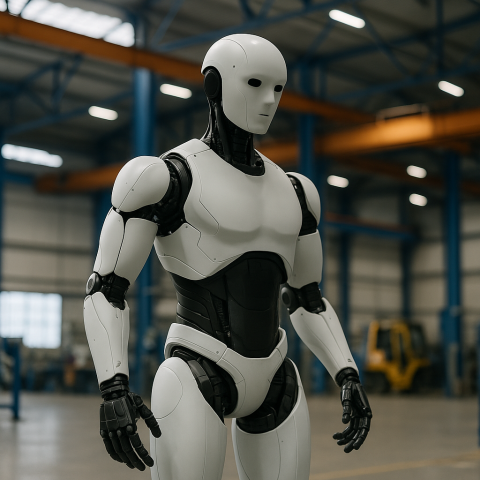
There’s a moment in every field when prototypes stop being cute and start being useful. For humanoid robotics, that moment might be now. In September, Figure AI raised more than $1 billion in Series C funding, pushing its valuation past $39 billion — but the real news isn’t the money. It’s where their robots are starting to show up.
Factories. Warehouses. Distribution hubs. Places where labour shortages and high costs have long been treated as inevitable. The company’s humanoid units — once confined to glossy demo videos — are now running pilot programmes in real-world environments, lifting, carrying, assembling, assisting. Slowly, steadily, they’re proving a simple but profound point: robots don’t have to replace humans to matter. They just have to help.
What’s striking is how quickly attitudes are shifting. A year ago, most people laughed off the idea of humanoids on the factory floor. Now, executives are signing deals and unions are debating how to integrate them into the workforce. And somewhere in between the scepticism and the excitement, a new reality is forming — one where human workers and machine colleagues clock in side by side.
It’s easy to mock the hype around robotics. But there’s nothing hypothetical about a machine that moves 30kg crates without breaking a sweat. That’s not sci-fi — that’s Tuesday.
“The future of work won’t be man or machine. It’ll be both, building something neither could alone.”
Cast Your Vote
Which of these startups deserves the September spotlight? We’re inviting readers to have their say — not on the loudest pitch or the biggest headline, but on the team you’d actually bet on to change the world.
Vote here - https://www.facebook.com/prime.economist
Editor’s Pick
Our editorial choice for September goes to Figure AI. Few companies embody the spirit of this month’s list quite like they do — not because of record-breaking funding rounds, but because they’re turning a long-promised future into a working present.
For decades, humanoid robots have lived mostly in sci-fi trailers and tech conference demos. Figure has dragged them out of fiction and into the factory floor — where they lift, carry, assemble, and earn their keep. This isn’t a concept video. It’s a product already reshaping how industries think about labour, productivity, and human-machine collaboration.
It’s no longer science fiction. It’s the opening chapter of a new industrial era — one written not in theory, but in steel, silicon, and sweat.